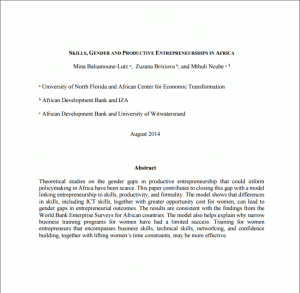
Policy highlights:
- One reason for the high share of women entrepreneurs in the informal sector is the gender gap in education and skills development. To bridge this gap, interventions are needed.
- Policy should be aimed at making technical schools and laboratories more accessible for women or at addressing traditions, laws and social norms that discourage women from such activities.
- Importantly, what works for men does not necessarily work for women. Training for women entrepreneurs that encompasses business skills, technical skills, networking, and confidence building, together with lifting their time constraints (often related to housework) could be more effective than narrow business training programs for women modeled on those for men.










